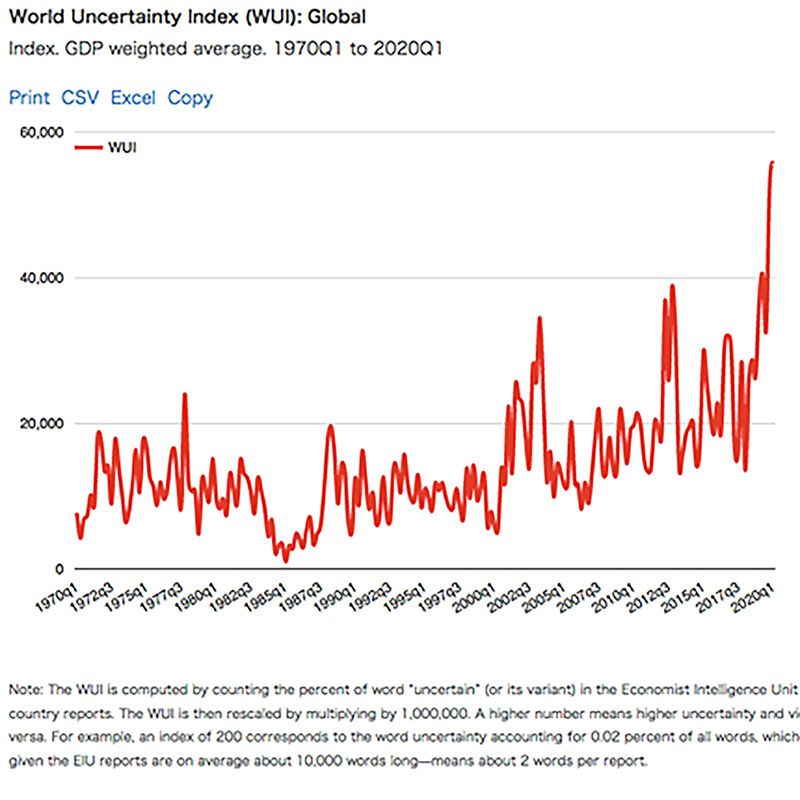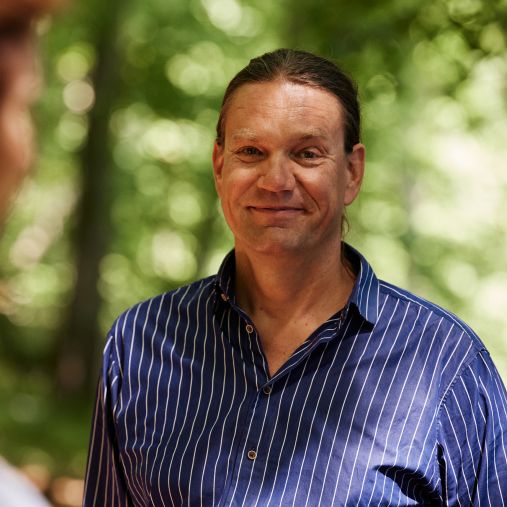The World Uncertainty Index and the four stages to resilience


The World Uncertainty Index, created by Stanford employees, shows a steep increase since well before Corona. The financial crisis of 2008 already pushed it into an initially abrupt and then continuous upward trend. Since that crisis, companies and societies should have specifically improved resilience, but have only done so in a few sectors, such as a careful reduction of global supply chains.
In many areas, such as healthcare, they not only refrained but actively weakened resilience. More by accident, digitization proved to promote resilience in the Corona crisis (home office, deliveries, among others). However, digitization was and still is driven by an old-fashioned pursuit of efficiency. Digital solutions are anything but resilient to other forms of crisis, such as energy outages or the constant threat of hackers.
We are therefore at a point where we do not only need to build new resilience quickly, but we also have to catch up on what has long been neglected. This double challenge requires systematic and thought-out action.
We have summarized in the four-step process RAMP, how this might look like for companies and institutions. This abbreviation stands for: Resilient, Anticipative, Monetary, Planetary, and it means:
Leading companies and institutions RESILIENTLY.
Set up your death scenarios and fully run them through in small teams. Identify your cluster risks, create fallback structures. Establish a plan for how you will realize the first three death scenarios yourself, for example, by eliminating at risk areas that cannot be protected. Be prepared for the exception. Spend money on these measures without short-term expectations of revenue. Accept that the usual criteria for efficiency do not apply here.
Only strong investments in passenger protection could save the aviation industry from a permanent crisis. In fact, however, it is already becoming apparent that with the goal of filling all the seats, efficiency will take precedence over effective protection.
Trade show companies that do not create virtual offerings will hardly be able to fill halls. Whether going online, e.g. via Meetyoo, will save the event industry seems questionable. Will establishing of servers preserve co-working business models like WeWork? Probably not. Even the urban hotel industry already rents out hotel rooms by the day as workspaces.
Align brands ANTICIPATIVELY with customers.
What changes are taking place in the customer's life, what will a good customer relationship look like tomorrow? What solution that is still to be found could excite the customer in the future? Check your customer relations in these regards. Make these relations resilient across multiple levels through fairness and generosity. Invest in the relationship and do not monetize it out of reflex. Do not abuse the relationship for marketing purposes. Avoid manipulations such as excessive habit forming, self-renewing trial contracts, or discounted new contracts. Develop new, credible ideas for rewarding continuity and customer loyalty.
Medical practices, for example, are investing in online consultations without much prospect of short-term refinancing. The need for this existed before Corona, the reason however did not. KinderarztNow demonstrates how to arrange online consultations and download prescriptions. Right now, the Faroe Islands offer virtual tours by horseback, kayak or as a hike. For this, locals not only carry 360° cameras with them, but also spontaneously answer questions from online travelers about particular sights.
Creating MONETARY added value through innovations.
Mutual revenue means not focusing unilaterally on revenue growth, but wholeheartedly serving customers with product and service innovations. Even with innovations that so far have been rejected internally or socially. Realize some of them. Train structural readiness for change and install a continuous innovation management.
Overcome possible aversion to drones and robots and test their applications, try co-operations. There are more possibilities than merely ministering services in drive-in theaters. If ticket expert Eventim can work with auditor PwC and others to develop an alternative Corona app, then you can also equip your ATMs with an iris scanner, offer your manufacturing workers goggles with distance indicators, or add disinfecting protective sleeves to your beverage cans. Ingenuity helps. Don't just produce gin, produce sanitizers. 3D-printed door openers or Knick'n'clean’s ultraviolet hygiene stick would have been customer-friendly innovations already, even before the crisis.
Business models should enable repeatability through PLANETARY compatibility.
Define basic key resources, competences, technologies or raw materials. Run through scenarios where one or more are omitted and take action to replace them sustainably. Determine ecological costs and ways to reduce them. Use crises as catalysts to reduce ecological costs. From this perspective, think about situational go-to-market scenarios.
Maybe you were already questioning your dependence on suppliers from China before the crisis. Now you can restructure, expand your in-house video chat capabilities and avoid harmful air travel while doing so. Test the use of plastic film made from fish scales by Marina Tex or develop new packaging from your waste yourself, like Feel the Peel. Create an environmentally sound alternative for every key resource.
In the continuously increasing uncertainty incident, the Corona crisis is an extreme. With RAMP we want to help to understand the conditions of the identifiable changes within the World Uncertainty Index and counter them. Because we cannot afford to repeat the failures of the last twelve years since the financial crisis a second time. This is the only way we will shape society and the markets tomorrow and not just manage past struggles.

You want to know how resilient your company is?
Take the free RAMP test.

